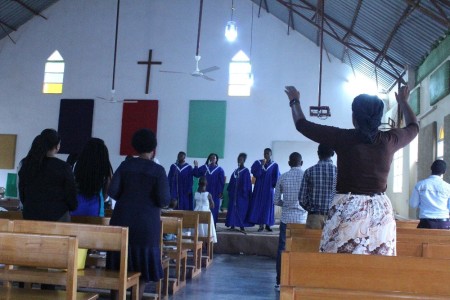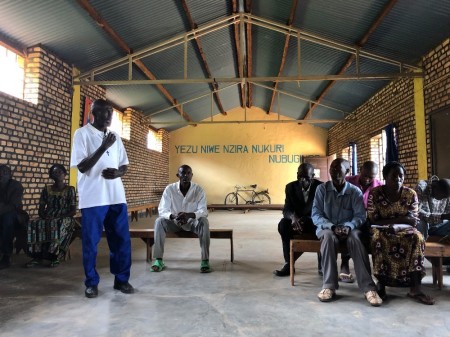Rwanda genocide 25 years later: How a Christian nation overcomes its troubling past

RWANDA — The doors to the church building were open as the sound of prayer and worship echoed into the street for all to hear as pedestrians, cars and loud dirt bikes went by.
Dozens were gathered for a service at an Anglican church in the town of Kacyiru, just outside of the landlocked African nation’s capital city. The worship band was decked out in blue robes as they belted their songs of praise, thanking the Lord for all that He has done and is doing to restore unity to the once genocide-ridden country.
Churchgoers heard a sermon from a visiting evangelical pastor that mirrored the motto that Rwandan churches and the Rwandan central government have stressed since the end of one of the worst human rights atrocities in decades: the need to live as “one” body under Christ. Or in the secular sense, the need for people to coexist as “one Rwanda.”
Although just two-and-a-half decades removed from the brutal murder of nearly 1 million Tutsis and moderate Hutus by extremist Hutus and security forces, the predominantly-Christian country today looks much different than it did in the summer and spring of 1994.
“Heavenly Father, we thank you that we can see in Christ that You made it possible for us to be one, to be one body, to be one Church,” Pastor Daniel Ledema prayed on a mid-February Sunday morning. “We know that this is something that we could never have achieved ourselves. [Please] break our hearts to help us see what are some of those … walls that should be broken down and walls that should be put down.”
Sunday marks the 25th anniversary of the beginning the genocide against the Tutsi, one of the worst atrocities in world history. With the permeation of extremist anti-Tutsi ideology through radio and newspapers, thousands of Hutus were pushed to mass violence after a plane carrying President Juvénal Habyarimana was shot down on April 6, 1994.
In the 100 days following, at least 800,000 or more people were killed, most of whom were minority Tutsis or moderate Hutus accused of being Tutsi lovers.
Despite Rwanda being about 90 percent Christian at the time, neighbors killed neighbors and Christians killed Christians in some of the most horrific ways imaginable.
No mercy was spared even for children and infants. In some cases, babies were killed while in their mother’s arms. In addition to communal violence, security forces were also responsible for the deaths of thousands of Tutsis, many of whom were killed inside of churches or other buildings they were told would be safe.
But today, there are genocide memorials and mass graves throughout the country filled with broken remains to educate and remind the next generation of Rwandans what a massive lack in education and the persistence of dangerous ideologies can do to communities that had once coexisted peacefully.
Today, the nation the size of Maryland but twice as populated is largely unified. The government no longer officially recognizes tribal and ethnic differences, something that used to be front and center on a person’s official government identification.
The country serves as an example of how a nation scarred from genocide pulled together with the help of government programs, churches and nonprofits to overcome ethnic division.
With neighbors having killed neighbors, the only way forward for many communities was for people to wholeheartedly embrace the radical forgiveness expected of them by their savior, Jesus Christ. While social tension in Rwanda is not perfect with anger and pain impacting at individual and familial levels, Hutu-Tutsi tension generally isn’t felt at a national level anymore.
With reconciliation having occurred in many communities, the focus now is on how to not only keep people unified but also how to improve the quality of life for people living in the densely populated nation of 12 million people.
Without many desirable resources like gold and diamonds, and an economy reliant on agriculture, about 20 percent of Rwanda’s population lives in extreme poverty and 44 percent live in moderate poverty, according to World Vision Rwanda Integrated Program Director Ananias Sentozi. The average income is about $150 per month.
But as part of the Rwandan government’s “Vision 2020,” the desire is to see Rwanda become a middle-income country. Although that may not happen by 2020, Rwanda has seen economic growth.
Over the last several years, the government, churches, and nonprofits like the evangelical-minded World Vision International have worked — in some cases together — to find ways to create better lives for these impoverished communities. Moving beyond reconciliation, the goal is to help move people from dependency to dignity.
Unity, togetherness, and oneness

Unity and reconciliation have been a national goal set by the Rwandan government led by the Rwandan Patriotic Front and President Paul Kagame, the former military leader who commanded the RPF rebel force that ended the genocide. Kagame has been elected to three terms since he took office in 2000 and his current term ends in 2024.
Despite concerns about how the RPF-led government has silenced political dissent, cracked down on the press, strictly governed and taken a stronghold on the Rwandan political system, Rwandans who spoke with The Christian Post were largely appreciative of the push the RPF has made in the last two-plus decades in challenging Rwandans to seek forgiveness, reconcile and work together to improve Rwanda.
After the genocide, about 100,000 Hutus were arrested and imprisoned for alleged involvement in the genocide, some of whom were innocent, locals say. With those many suspects awaiting trial, it would have taken over a lifetime to handle all those cases.
Struggling to dole out justice on such a massive scale, the federal government instituted a system of community justice in the early 2000s called the “Gacaca” court, where perpetrators could be tried among their peers in their communities who witnessed the crimes they committed.
Along with that was an emphasis on the idea that perpetrators should go back to their communities to seek forgiveness.
Several perpetrators were let out of prison to be tried in their community courts where victims could attest to the crimes they committed.
In many cases, perpetrators were forgiven by their victims. Considering there was much work to do to rebuild the destroyed communities, many perpetrators were released from prison and sentenced to work toward the reconstruction of homes and buildings in their communities.
Some communities even established associations of genocide perpetrators and survivors working together to rebuild the homes.
Over time, with teachings from the government and churches, more relationships were reconciled.
"The motto for our country is unity, togetherness and oneness," Jean Bosco, a Catholic priest serving in the rural village of Rugango in Rwanda’s Southern Province, told reporters who visited him during a World Vision press trip.
"Because there was one mission to reunite Rwandans and build the country, it was easy for the government and the church to come together to make that a reality."
Bosco’s parish last year, with the help of World Vision Rwanda, the nation’s largest humanitarian organization that has been active in the country since 1994, set up classes for genocide perpetrators and victims to help them embrace the biblical call to forgive those who trespassed against them and call for those who have wronged to repent.
The classes are open to all community members even if they are not part of the parish. One student of the class was a Pentecostal man who is the lone survivor from a family of 40.

Bosco’s parish is one of many churches across the country that have partnered with World Vision to help foster reconciliation among Hutu and Tutsis in their communities.
With an evangelical mission, World Vision began in 1994 providing relief and assistance. The charity later transitioned to focus on fostering unification in the Rwandan communities.
In addition to the teachings on forgiveness, the months-long course in the Rugango parish culminates into a business cooperative among the members of the group.
As a way to help economically empower the poor agricultural community, the first class of 84 graduates from the course launched a beekeeping enterprise that they hope will one day bring about financial gain.
The parish launched a second group of perpetrators and survivors that are now going through the months-long course. Rugango community leaders plan to hold more reconciliation classes in the future. So far, over 160 people in their village have taken the course.
“Despite the fact that it has been 25 years, those memories never go away and crimes never really go away,” the class’ facilitator Mukankrange Vestine, who lost several members of her own family during the genocide, said. “So, they are blessed to leave them behind.”

While many international humanitarian organizations were present during the immediate aftermath of the genocide, many are no longer active there. One that has remained present in Rwanda for the last 25 years has been World Vision, which has branches in nearly 100 countries.
Now that reconciliation has been achieved in many Rwandan communities, World Vision’s focus these days lies in faith and development work. World Vision seeks to teach villagers to look deeper in themselves to see their true potential.
“Yes, our motto is the mind, the heart, and the pocket,” Aimable Nsengiyumva, who heads up World Vision’s cluster office in the Southern Province, said. “We start with the mind, which changes the heart. When the mind is changed, the heart changes. When the heart is changed, [so is] the pocket.”
Follow Samuel Smith on Twitter: @IamSamSmith
or Facebook: SamuelSmithCP






















